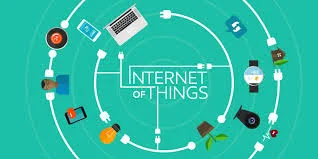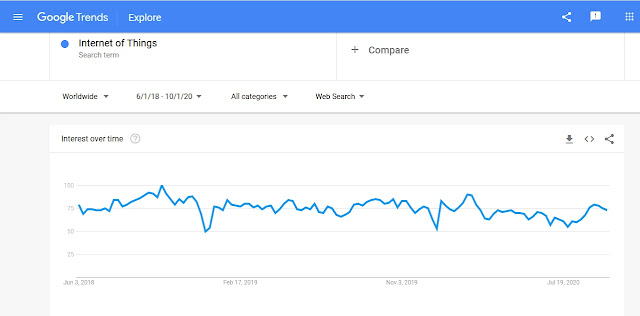Introduction:
Hi there! I am here again to give you very useful information which will make our life digital to the extreme level, The Internet of Things.You probably know What is IoT and if no, I'll make you understand in this article.
First of All, I wanna make you curious to know about IoT and its scope in the future and what revolutionary change is bringing in the next years. So, let's start with the introduction.
Also read: Three steps which brought the concept of IoT?
What is the Internet of Things(IoT)?
The Internet of Things or IoT is influencing our lifestyle from the way we react to the way we behave from air conditioners that you can control with your smartphone to smart cars providing the shortest route, or your smartwatch, which is tracking your daily activities.Well, here, the internet has been around for a while. But it's been mostly the product of people. So all the data and images and recordings and games, books and commerce, and all of that was created by people, for people, and about people.
See, the internet is one of the most important and transformative technologies ever invented. I happen to know a few people who couldn't live without it. The Internet is like a digital fabric that's woven into the lives of all of us, in one way or another.
Must read: How to make a career in IoT?
The Internet of people changed the world. Well, there's a new internet emerging, and it's poised to change the world again, you see this new Internet is not just about connecting people. It's about connecting things. And so it's named the Internet of Things.
Okay, so connecting things to the internet, a big deal, right? Well, it kind of is. And here's why. Because things can start to share their experiences with other things. Wooo, wait, what?
How that works? Right!
Well, it works like this, you take things and then you add the ability to sense and communicate, and touch and control. And there, you get an opportunity for things, to interact and collaborate with other things.
So think of it like this. We as human beings, we interact and contribute and collaborate with other people in our environment through our five senses, we are seeing and smelling and in touch and taste and hearing, right?
Well, imagine things with the ability to sense and to touch and then add the ability to communicate. And that's where the Internet of people and the Internet of Things intersect.
So what are some examples of these things?
Well, let's start here. How about your smartphone, You wouldn't believe it how many senses your smartphone has.
- It knows where you are, knows if you're moving,
- It knows how you're holding it.
- It knows how many lights in the room.
- It knows how close it is to your face.
- It knows what you're saying to it.
- And it even has an eye so it can see its surroundings.
- Oh, and it also can communicate on a wireless network.
Let's take a look at one of the first IoT devices.Okay, all of us probably have one of these in our homes, maybe a version of one of these. It's a thermostat. But this thermostat does way more than just knowing the temperature in the room.
Must try: How IoT is revolutionizing the supply chain?
It knows whether I'm in the room or not. And it learns and tracks my home in a way patterns to ensure my comfort and save energy. And it communicates on a network. So I can control it from afar.
Let's discuss more,you must have heard of smart devices like smartwatches, smart cars, smart bulbs, etc.So with smart light bulbs, I can create all kinds of moods with brightness, light, dimming, and so on. But because they communicate on a network, they know how to listen. So I can tell them, or other things can tell them to turn on-off or blink.
Now, there's a lot of things that were manufactured and built before the Internet of things. And the good news is we have tools and systems that allow you to add sensing and communications capabilities to existing things.
Imagine it!
Well, allow me to take you on a pictorial of My typical day or my typical morning, in the Internet of Things. There I am lying blissfully asleep. And you can see I have my armband on.
And the beauty of that is it's sensing my sleep cycles, and it knows the most opportune moment to gracefully wake me up by gently vibrating and blinking light. Well, when that happens, my bracelet sends a message to other things in my home.
And pretty soon a chain of events starts to occur, where my things are talking to other things. For example, my thermostat goes up to 80.
As my whole house fans start-up and draw all the cool morning air into my home, which pre-cools my home, allows me to not turn on my air conditioning for later in the afternoon, saves me a boatload of electricity.
Must read: How to career in IoT?
And my coffeemaker starts up and my bedside lamp fades to bright. So then I'm kind of curious, how did I sleep last night, so I roll over and grab my phone. And the good news is, I exceeded my goal.
As I like to get up in the morning and go for a walk.So while I'm walking, I get an email, and it says that my spa just turned on.
So, I go over into my app after taking a bath for my spa and I ensure that the spa was turned back off. And then while I'm here I thought, you know, I wonder how much water went on my lawn this morning.
I see my sprinkler thing communicates with the local water districts thing that senses a bunch of parameters and tells my sprinkler system how much water to apply to my lawn.
Well, that's important today with our current drought conditions. So it's certainly conserving water, and I say, I save on my water bill as well. So I get back from my walk, I eat my breakfast, and everything is good. They're kind of wrapping things up.
Must read: Three steps which brought the concept of IoT
It's time to hug my friends. And I have hug sensors in my shirt that measures how many hugs like I'm kidding, I'm, that's not true. I don't have huge sensors on my shirt. But the Internet of Things does include smart textiles and clothing.
So we'll be looking out for that. So I can go on and on about my day's events and tell you, how it correlates and interacts with the Internet of Things. But I think you get my point.
IoT is a giant network of connected devices. These devices gather and share data about how they're used, and the environment in which they're operated. It's all done using sensors. Sensors are embedded in every physical device.
Also read: How is the Internet of Things revolutionizing our life?
These sensors continuously image data about the working state of the devices.
But the important question is,
how do IoT devices share this huge amount of data?
And how do we put this data to our benefit?
IoT provides a common platform for all these devices to dump their data and in common language for all the devices to communicate with each other.Data is emitted from various sensors and sent to IoT platforms, purely IoT platform integrates the collected data from various sources, further analytics is performed on the data and valuable information is extracted escrow requirements.
In an AC manufacturing industry, both the manufacturing machine and the belt has sensors attached.
They continuously send data regarding the machine health on the production specific to the manufacturer to identify issues beforehand.
A barcode is attached to each product before leaving the belt. It contains the product code, manufacturer details, special instructions, etc.
The manufacturer uses this data to identify where the product was distributed and tracks the retailers better. Hence, the manufacturer can make the product running out of stock available.
Next, these products are packed and parcel to different retailers. Each retailer has the barcode readers to track the products coming from different manufacturers, manage inventory, check special instructions and many more.
The compressor of air conditioner has an embedded sensor that emits data regarding its health and temperature. This data is not analyzed continuously, allowing the customer care to contact you for the repair work in time.
This is just one of the million scenarios. We have smart appliances, smart cars, smart homes, smart cities, where IoT is redefining our lifestyle and transforming the way we interact with technologies.
Who cares about IoT? Why should you also care about IoT?
I get it. Big Business, tech giants, people like me, we care, right? We're in it. We're thrilled by this, this is the next big thing.
But why should you care?
Here's an example of knowledge today, or Data to Knowledge, Google flu, be heard of this. This is cool. So what Google has done is they started tracking the location and frequency of search terms related to the flu, flu symptoms, flu, diseases, flu treatments.
Are there Challenges in implementation of IoT?
But are there challenges? Are there pitfalls? Are there blind spots? We don't even see yet? The answer is yes to all three. First, it's human nature to resist change. But, what about privacy and security?
Can you say the same about my armband? Or my garage door opener? I don't know. Maybe not yet. It's something I think we all need to work on. But what if there were some significant boosts to our quality of life? Would that be enough to prompt us to move ahead with the Internet of Things?
Good news!
There's good news for you all. I will make a comprehensive series for IoT, which would give you everything about IoT.Must read: What is 5G technology?
Business Insider intelligence estimates that 24 billion IoT devices will be installed by 2020 and IDC predicts that IoT revenue will reach around 357 billion in 2020, resulting in a lot of job opportunities in the IT industry.
Want to become a part of the IoT revolution?
Give a pleasant comment to answer this question.






















Superb
ReplyDeleteReally appreciate this wonderful as we have seen here. This is a great source to enhance knowledge for us. Thankful to you for sharing an article like this. Plug and play T12HO LED tubes
ReplyDeleteThis Blog is Absolutely Good.
ReplyDeleteLTS
Thank you for sharing such a useful article. It will be useful to those who are looking for knowledge. Continue to share your knowledge with others through posts like these, and keep posting on
ReplyDeleteBig Data Solutions
Advanced Data Analytics Services
Data Modernization Solutions
AI & ML Service Provider
I'm glad to see that my work is fruitful for you!
Deletedf
ReplyDeletesd
ReplyDeleteI cannot thank you enough for the blog. Much thanks again.
ReplyDeletewho is chen zhi
Thanks for the post. Really thank you! Much obliged.
ReplyDeletecambodia chen zhi group
Very good article post. Want more.
ReplyDeleteprince chenzhi
Really appreciate you sharing this post. Really thank you! Want more. prince group cambodia
ReplyDelete